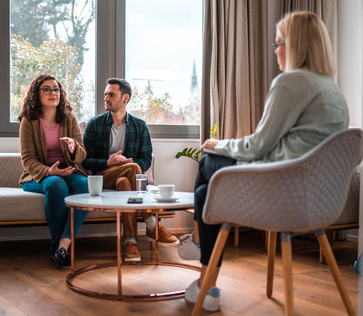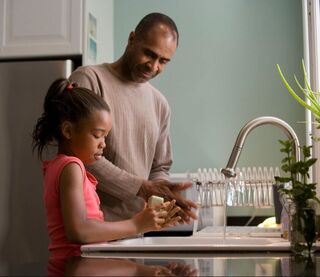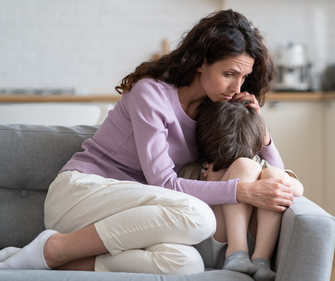Helping Your Child Cope with Anxiety
When your child struggles with anxiety or OCD, you might find yourself feeling confused about how to help them, and sad that they are missing out on experiences that used to bring them joy (e.g., missing sleepovers, dropping out of recreational sports). I often talk to parents who are doing everything they can to help their child, but it’s just not working - and they are understandably so frustrated.
SPACE Therapy for Anxiety and OCD

I specialize in providing SPACE (Supportive Parenting for Anxious Childhood Emotions) therapy to parents of children struggling with anxiety, OCD, or related issues.
I teach parents tools to help them navigate difficult situations with their anxious child. Knowing how to respond when your child is overwhelmed with anxiety or OCD is HARD.
Parents often ask themselves ...
➡️ When should I push my child to face their anxiety and fears?
➡️ What can I do when my child is stuck in a compulsion?
➡️ When should I give my anxious child a pass because they're at their breaking point?
I teach parents tools to help them navigate difficult situations with their anxious child. Knowing how to respond when your child is overwhelmed with anxiety or OCD is HARD.
Parents often ask themselves ...
➡️ When should I push my child to face their anxiety and fears?
➡️ What can I do when my child is stuck in a compulsion?
➡️ When should I give my anxious child a pass because they're at their breaking point?
When we work together in the SPACE treatment, parents learn to respond in a way that:
✅ Validates your child's emotions in a supportive way, and
✅ Helps your child learn effective coping tools to face their fears related to anxiety and OCD
Based on the research from the SPACE treatment program and my clinical experience with families over the last 15 years - this therapy will give you the tools you need to help your child.
✅ Validates your child's emotions in a supportive way, and
✅ Helps your child learn effective coping tools to face their fears related to anxiety and OCD
Based on the research from the SPACE treatment program and my clinical experience with families over the last 15 years - this therapy will give you the tools you need to help your child.
What is SPACE Therapy?

SPACE is an effective, research-based treatment that was developed at Yale University, where the therapist meets exclusively with the parents of children struggling with anxiety, OCD, or related issues.
I completed formal training in SPACE treatment in 2020 with Dr. Eli Lebowitz, the psychologist who developed the SPACE treatment. I have seen first-hand how parents learn to calmly and effectively respond to their child’s anxiety, and most importantly – how children begin to effectively cope with anxiety and OCD.
I completed formal training in SPACE treatment in 2020 with Dr. Eli Lebowitz, the psychologist who developed the SPACE treatment. I have seen first-hand how parents learn to calmly and effectively respond to their child’s anxiety, and most importantly – how children begin to effectively cope with anxiety and OCD.
SPACE Therapy for Parents of Teens + Adult Children
This treatment is not only for parents of young children - SPACE Therapy is also very helpful to parents of teens and adult children who struggle with anxiety and OCD. If your teen or adult child struggles with anxiety or OCD, you might notice that they are:
➡️ Feeling overwhelmed about high school and college coursework
➡️ Avoiding hanging out with friends because they feel anxious
➡️ Feeling stuck in their careers, despite having great potential
➡️ Starting to feel down and depressed - is my life just going to be full of anxiety or OCD forever?
Sometimes teens or young adults are unwilling to engage in therapy themselves. Or maybe they have been in therapy, but aren't making progress. In either case - there is SO much that you can do as their parent to help them cope with anxiety or OCD.
Ready to learn more about these research-backed tools from SPACE Therapy to help your teen or adult child? Let's chat soon.
➡️ Feeling overwhelmed about high school and college coursework
➡️ Avoiding hanging out with friends because they feel anxious
➡️ Feeling stuck in their careers, despite having great potential
➡️ Starting to feel down and depressed - is my life just going to be full of anxiety or OCD forever?
Sometimes teens or young adults are unwilling to engage in therapy themselves. Or maybe they have been in therapy, but aren't making progress. In either case - there is SO much that you can do as their parent to help them cope with anxiety or OCD.
Ready to learn more about these research-backed tools from SPACE Therapy to help your teen or adult child? Let's chat soon.
Wait, SPACE Therapy is for me (the parent)?
Yes! Here's why. Cutting-edge research has shown that SPACE treatment, which involves working exclusively with parents, is just as effective as cognitive behavioral therapy with the child directly. It's truly ground-breaking research, and I am so excited to be offering this service in-person to families in South Florida. I am also licensed to meet via tele-health with families throughout Florida and 39 other states.
Check out these ground-breaking study results, this NPR article, and this amazing TEDx Talk that explain why SPACE therapy has been life-changing for so many families whose children struggle with anxiety and OCD.
Check out these ground-breaking study results, this NPR article, and this amazing TEDx Talk that explain why SPACE therapy has been life-changing for so many families whose children struggle with anxiety and OCD.
Parenting Tips: Help your Child Cope with Anxiety or OCD
During SPACE therapy, you'll learn MANY research-backed parenting tools. It's normal to question - wait, shouldn't my child or teen be learning about this?
But the truth is, when kids struggle with anxiety, it is inevitably a family affair. Parents do not cause their children to experience anxiety, but they do play a key role in the trajectory of their child’s anxiety. As a parent myself, I know how hard it is to think clearly and calmly when your child is suffering. I get that sometimes the only thing that computes in your brain is: How can I make my anxious child feel better RIGHT NOW?
But the truth is, when kids struggle with anxiety, it is inevitably a family affair. Parents do not cause their children to experience anxiety, but they do play a key role in the trajectory of their child’s anxiety. As a parent myself, I know how hard it is to think clearly and calmly when your child is suffering. I get that sometimes the only thing that computes in your brain is: How can I make my anxious child feel better RIGHT NOW?

After a decade of working in the trenches with families in this struggle, there are several key mindset changes (like this one!) AND specific skills (like this one) that can be game-changers. Once you master these, you'll be able to confidently and effectively support your child in learning to cope with anxiety and OCD.
You can check out a few of my best tips on how to help your child cope with anxiety over on my Instagram page!
⚠️ Disclaimer - Instagram is not therapy.
You can check out a few of my best tips on how to help your child cope with anxiety over on my Instagram page!
⚠️ Disclaimer - Instagram is not therapy.
Starting SPACE Therapy in Florida (and most other states!)
Do you have questions about whether this parent-focused SPACE therapy is a good fit tor you? If so, let’s set up a time to talk. I am a licensed psychologist with specialized training in SPACE treatment. I work with families throughout Florida and many other states (via tele-health), and in-person from my office in South Florida (Pembroke Pines).
If you're ready to take this important step in helping your child learn how to cope with anxiety or OCD - I'd be honored to join you on the journey.
If you're ready to take this important step in helping your child learn how to cope with anxiety or OCD - I'd be honored to join you on the journey.


